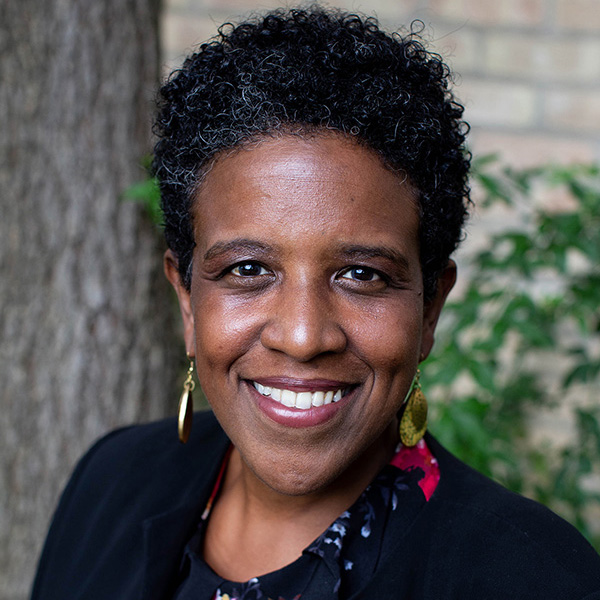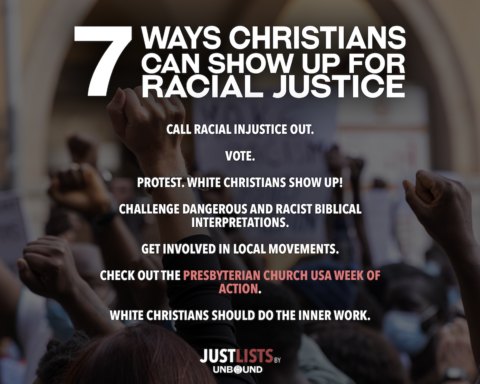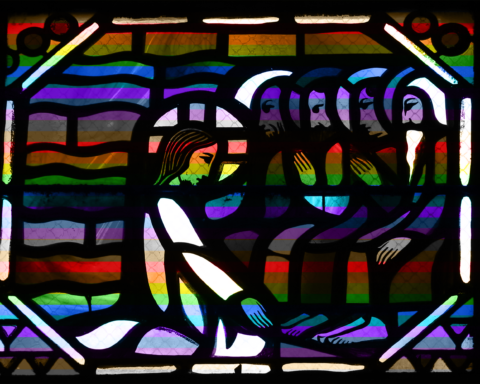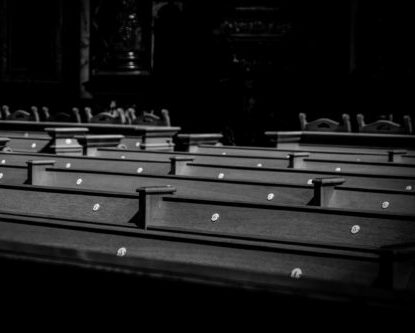Iosso:
Are there other places in scripture where we see the identification between God and the poor, or the least of these? This reversal of expectation, that unveiling, that sense of, “Oh, there’s God where we don’t expect God to be?” Do other texts come to mind? Because I think the power of the text carries some surprise; “we didn’t know we were helping God.”
Aymer:
That’s right. I think this text is unusual in that particular focus in that “we didn’t know we were helping God” part. You have picked up on the emphasis of the text, the word “me,” in whatever you did to the least. “This is to me, you did it.” The word me is actually fronted before the verb, which is an unusual place for it. It is actually underlined and emphasized. If I could emphasize the text, let me read it the way I have it translated:
“Come you who are blessed by my father. Inherit the prepared-for-you kingdom, from the foundation of the cosmos. I hungered and you gave to me in order that I might eat; I thirsted and you gave to me to drink; a stranger was I, and you received me as a guest; naked and you clothed me; I ailed and you looked after me. Imprisoned was I, and you came to me.”
“Then the just or upright women will respond to him, ‘Master, when did we see you hungry and feed you or thirsty and give you to drink? When moreover did we see you as a stranger? When did we see you ailing? Or in prison?’ In response the King will say, ‘as often as you acted this way to one of these, my siblings, the least ones, to me you acted this way.’
So you notice what is at stake for them. When we do this, we do this to Christ, to God, to the King. We’re acting to each one as if to the King.
Perhaps the Hebrews text, welcome strangers because some have welcomed angels unawares, is a close example of this. And the Beatitudes (Mt 5) has a hint of this, that the impoverished in spirit and those who are persecuted will inherit the kingdom. Those who are pure in heart will see God. Those who are peacemakers will be called sons of God, not just children of God, they will be called sons of God. So there’s that sense of the divine showing up among the least of these, but this text is pretty unusual in how hard it hits this.
Eileen Schumann:
I’ve been struggling with the actual English translation of the words “least of these,” out of concern that using the words broadly might create superiority complexes, savior complexes, just by virtue of the meaning of the words.
Aymer:
Sure. Great question. The question is not whether or not we categorize people better. The question is, again, thinking about Matthew’s first two texts. The question is how were these people already categorized within the community? Right. So when the text talks about the littlest, the least of these, it’s talking about those who already in the community would have been stepped over, overlooked, discarded. In the ancient world, that would’ve been those who were hungry, the beggars, the ones who had the begging bowls outside, little hungry children who had maybe nothing to wear. These would have been ‘the least of these.’ Those who had been taken away by Romans and put under guard. In those days, there was no prison industrial complex. So people weren’t fed three meals a day and clothed and had a place to sleep in prison. You might be imprisoned in a cave, you might be imprisoned in a house. The guards were there and their job was just to keep you there.
They weren’t there to feed you or make sure you had a change of clothes or anything else you need. If you were sick, they couldn’t tend to you. So if you needed food, someone had to come and tend to you. If you needed clothes, someone had to bring that to you. So all of these people would have been considered the lowest of the low. And there is a theology that’s still very much out there; if you are in this state, you are there because you are in some way cursed by God. God is in some way punishing you because you don’t have everything. You’ve got this theology in Deuteronomy that the evidence of God’s blessing is your wealth.
In many ways, Matthew’s text is challenging this notion that the evidence of God’s blessing is your wealth by saying, ‘not only is this not the evidence of God’s blessing, if you don’t see and tend to those people who look like they have been crushed by God, you yourself will be cursed by God.’
So your question points to a danger. We could get into this kind of Christian superiority complex. ‘Oh, we’re looking for the least of these, and we’re better than they are.’ But what we’re looking for is really the face of God. What the text is saying is, if you’re really searching for God, go find the poorest of the poor.
Andrew Kang Bartlett:
In a way you just answered part of my question, but I guess I was thinking about the nature of the time when Matthew was written versus our context today. With an occupying force, it’s pretty clear who the oppressor is and who’s hurting people. In our context now, we’ve institutionalized, we’ve kind of taken the weaknesses and evil within people and put them into our institutions and into our economy. We’ve bought into that ourselves with our 401k’s, et cetera. So it’s less clear who the occupier is when we embody the occupier in our own bank accounts and our everyday actions. Similarly, it’s less clear who the poor is or who the most vulnerable is when many people have multiple identities, some of which may be of extreme vulnerability, some of which may be of relative privilege. So does Matthew or you have a special word given our current complex context? Does this tell us how we can move forward in a way that is just and helpful to the world?
Aymer:
Well, yes, we now live in the occupying power and many of us are very much involved and invested in the occupation. We are the ones who have the power. The Christian Church in Matthew did not have power. Still, I would say for local congregations and local communities, the first question is, who’s hungry? Who’s thirsty, where I live? Who is lacking, where I live? Who is a stranger in the community? Who are the ones who are sick and where are the imprisoned? Already, if a church is responding to the groups like those in the neighborhood, the church is responding.
If, then, the church begins to ask the question, why are the hungry hungry? Why are those who thirst thirsty? Then the church is called to respond to even further because by asking why are the hungry, hungry, then we begin to ask questions of the systems, what are the systems that are in place that make it impossible for this person to get food? And then we begin to ask, how are we involved in those systems and how can we help to change them?
These are questions that Matthew’s community could not ask because they didn’t have that kind of power. Rather than worrying about our entanglement, our entanglements will untangle themselves naturally when we start asking those questions. But first we need to know who we’re talking about. You know, in Austin, Texas, a lot of the people that are poor and disenfranchised are white drug addicts living on the streets. They came here to be rock and roll stars or country stars and then they got on drugs and now they live on our streets, mentally ill.
They are the poor and homeless and it’s a very different set than in Atlanta, which is a very different set than in New York. The questions of clothing, of housing, of thirst, all of these are local questions that have local responses initially. It’s only when you begin to pull those threads of, so why are they hungry in the first place, that you begin to gather around the bigger systemic issues. Once you gather around the biggest systemic issues, you naturally start to ask yourself, how do I help to uphold these systems? So I would start from where you are, rather than trying to start from the country as a whole and trying to move local, because we will never get it right at the country as a whole if we’re not getting it right in our native areas where we are.
Let us look at a different topic, local for me, a “why” question not particularly connected to Matthew 25. Why is it that white young men are picking up guns and killing people? I’m raising a white young man. Some of you know that I’ve got a white male child who is now in kindergarten and one of the questions is racism. Well, how do white young men become racists? What are the things that we need to do to teach white, young men not to be racists–so they don’t pick up these guns? How do we teach children? How do I teach my child? And then how does my child’s kindergarten teach this child? Then how does my community, and so you become involved at the grassroots, you always do. Does that make sense? Does that answer your question at all? Yes. Okay.
Ryan Smith:
You mentioned the beatitudes and I’m always drawn to Elias Chacour’s reframing. It’s going back to Aramaic saying they’re not these passive blessings on the poor, but it’s get up, go ahead and do something. Move. And so I’m wondering if there is a similar type of translation that can be used with Matthew 25 so that it’s not just what you did to the least of these, but how are you acting? What are you doing? Kind of a more active verbiage if you go back to Aramaic or if that’s just a unique thing with the Beatitudes that I once read?
Aymer:
Well, though I love Elias Chacour’s reading, I don’t agree with him because they’re probably composed in Greek. The reason the Beatitudes were probably composed in Greek, even if they were originally spoken in Aramaic, is of the poetry. It’s very hard to recompose poetry in another language. I know, I’m reading Dr. Seuss in French to my son. It’s not the same. You really can’t capture the neatness of poetry from one language to another. Bracketing Elias Chacour for a second, the Matthew passage is actually writing in a future about what you should have already done. It’s at a point where it’s too late to turn around and do it now. So I think the call of the Matthew passage is active but it can’t be translated as active because it is imagining a time when the chance to do those works is over, for at least the people standing at that particular judgment seat where the nations no longer have the option.

Margaret Aymer joined the faculty of Austin Seminary in 2015. She teaches core courses on the Introduction to the New Testament, Exegesis, and Greek and elective courses in numerous disciplines including African Americans and the Bible, and feminist and womanist biblical interpretation. Active in the Society of Biblical Literature and American Academy of Religion, she has spoken as a guest lecturer at numerous academic and church conferences across the United States, including the 2013 MidWinter Lectures at Austin Seminary. There she was the Robert Jones Lecturer, offering a discourse on the “New Testament as Migrant Writings.” Aymer wrote Confessing the Beatitudes, the 2011 Horizons Bible Study (the annual Bible study resource for Presbyterian women), for which she won the Award of Excellence by the Associated Church Press.
Aymer has published four books: James: Diaspora Rhetorics of a Friend of God (Sheffield Publishing, 2014), Fortress Commentary on the Bible (with Gale A. Yee, Fortress Press, 2014); First Pure, then Peaceable: Frederick Douglass Reads James (T&T Clark, 2008), and Islanders, Islands and the Bible: Ruminations (Semeia Studies, 2015; with Jione Havea).
Prior to coming to Austin Seminary, Dr. Aymer taught at Interdenominational Theological Center in Atlanta, Georgia, since 2004. Aymer has served the Presbyterian Church (U.S.A.) broadly. She has served on the Presbyteries’ Cooperative Committee on Examinations since 2010, moderating the six persons who write the Bible Exegesis Ordination Examination for the Presbyterian Church (U.S.A.). She was a member of the Committee on Preparation of Ministry of the Presbyterian Church (U.S.A.) from 2010-2011, training sessions (governing bodies) of local congregations on the ordination process and their responsibilities therein. Aymer was also a member of the General Assembly Task Force on Civil Unions and Marriage (2009-2010), and she served as a steering committee member for the Committee on Theological Education Consultation on Racism from 2004-2008.






Unbound Social